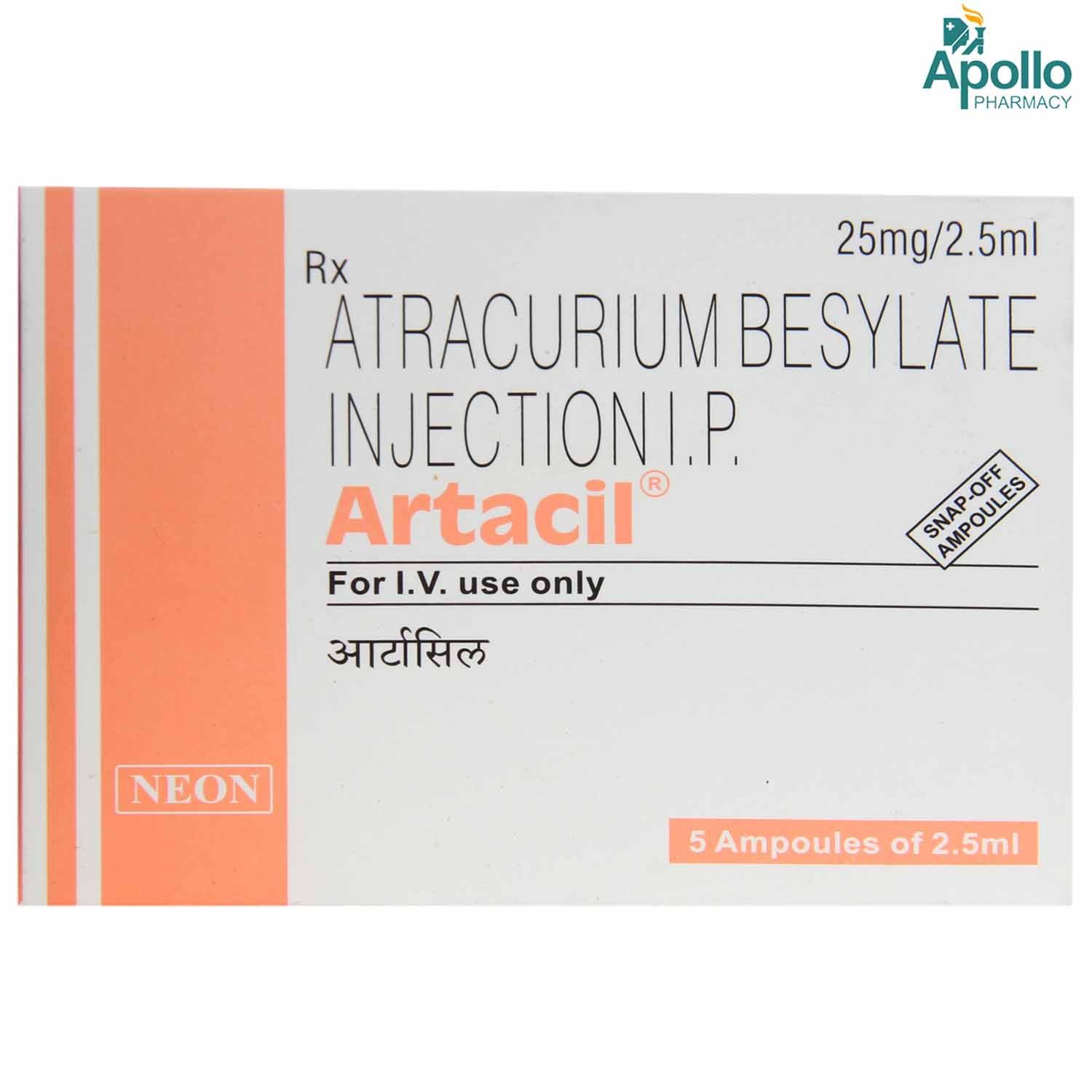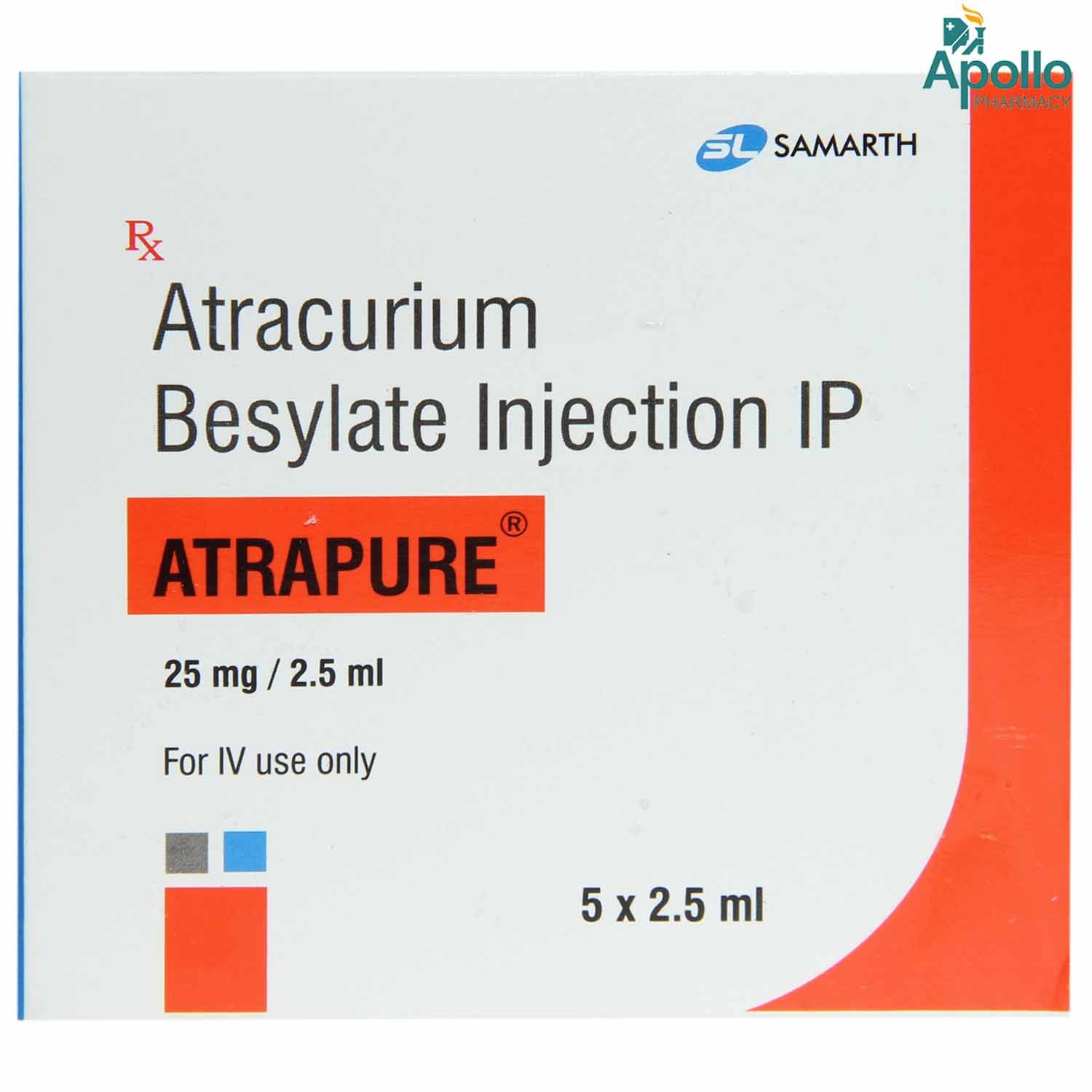Atracurium
About Atracurium
Atracurium belongs to the group of medicines called skeletal muscle relaxants used to reduce and relieve muscle spasms (excessive tension in the muscles) occurring during surgery in intensive care. Muscle spasm is the sudden involuntary contractions of the muscle, which can be painful and uncomfortable. When the nerve impulses that control the muscle movements are damaged or interrupted, it could lead to muscle spasms.
Atracurium contains ‘Atracurium’ that works by blocking the action of acetylcholine on skeletal muscles. Thus, stop sending a pain signal to the brain, relieving muscle stiffness or muscle spasm along with pain and surgery. Atracurium is used during surgery. It is also used during general anaesthesia to ease tracheal intubation (a tube into the windpipe) and controlled ventilation.
Atracurium is given by the healthcare professional during surgery. In some cases, you may experience tachycardia (rapid heartbeat), temporary hypotension (low blood pressure), wheezing, bronchospasm (asthma-like symptoms), skin flushing, and urticaria (nettle rash). Most of these side effects of Atracurium do not require medical attention and gradually resolve over time. However, if the side effects are persistent, reach out to your doctor.
Before receiving Atracurium inform your doctor if you have had myasthenia gravis or Eaton-Lambert syndrome, severe electrolyte disorder, asthma-like symptoms (a history of allergy, asthma or bronchospasm), burns and lack of adequate circulatory filling (hypovolaemia), pregnant or breastfeeding mother. Your doctor will prescribe Atracurium only if the benefits outweigh the risks. Atracurium is not recommended in neonates (children under the age of one month). Atracurium is a cold chain medicine, and so it has to be stored in the refrigerator between 2-8 degrees Celsius else its efficiency might get lost. Do not store in the freezer or the fridge.
Uses of Atracurium
Medicinal Benefits
Atracurium belongs to the group of medicines called muscle relaxants used to reduce and relieve muscle contraction (excessive tension in the muscles) during surgery, other procedures, and in intensive care. It is also used to calm muscles while on a breathing machine, during general anaesthesia to ease tracheal intubation (a tube into the windpipe), and controlled ventilation. It works by blocking the action of acetylcholine on skeletal muscles. Also, stop sending a pain signal to the brain, relieving muscle stiffness or muscle spasm along with pain and surgery. An experienced doctor must give Atracurium under carefully controlled conditions. It is used during procedures that require that the patient is fully anaesthetized (unconscious) or heavily sedated.
Directions for Use
Storage
Side Effects of Atracurium
- Tachycardia (rapid heartbeat)
- Temporary hypotension (low blood pressure)
- Wheezing
- Bronchospasm (asthma-like symptoms)
- Skin flushing
- Urticaria (nettle rash)
Drug Warnings
Before you receive Atracurium, tell your doctor if you have a disease that affects the muscles and nervous control (neuromuscular disease such as myasthenia gravis or Eaton-Lambert syndrome (muscle disorder)), a severe electrolyte disorder, cancer spread widely from a primary source (carcinomatosis), a sensitivity to histamine, asthma-like symptoms (a history of allergy, asthma or bronchospasm), burns, lack of adequate circulatory filling (hypovolaemia). Atracurium should not be given to pregnant women unless prescribed. If you are pregnant or breastfeeding, think you may be pregnant or are planning to have a baby, ask your doctor or pharmacist for advice before taking Atracurium. Mothers should stop breastfeeding for 24 hours after receiving Atracurium. Atracurium is not recommended in neonates (children under the age of one month) as safety and effectiveness in pediatric patients below the age of 1 month have not been established. Atracurium some formulations containing benzyl alcohol. In neonates, benzyl alcohol has been associated with an increased incidence of neurological and other complications, sometimes fatal.
Drug Interactions
Drug-Drug Interaction: Atracurium may interact with antibiotics (polymyxins, spectinomycin, tetracyclines, lincomycin, clindamycin, vancomycin), antiarrhythmic medicines (lidocaine, procainamide, quinidine), diuretics (furosemide, thiazides, acetazolamide, mannitol), medicines used to control blood pressure (propranolol, oxprenolol diltiazem, nicardipine, nifedipine, verapamil), antiepileptic medicines (carbamazepine, phenytoin), drugs used to treat rheumatism (chloroquine, d-penicillamine), corticosteroids (beclomethasone, budesonide, prednisolone, fluticasone, mometasone, triamcinolone), medicines used to lower blood pressure during surgery (trimetaphan, hexamethonium), muscle relaxant (dantrolene), an anaesthetic drug (ketamine), treatment of mental illness (lithium, chlorpromazine).
Drug-Food Interaction: Avoid alcohol intake and tobacco consumption with Atracurium as it may cause increased drowsiness, dizziness, and lack of concentration.
Drug-Disease Interaction: Atracurium may have interactions with burns, histamine, myasthenia gravis (muscle disease), paresis (partial paralysis), pulmonary impairment, liver disease, kidney dysfunction, and seizures (fits).
Drug-Drug Interactions Checker List:
Safety Advice

Alcohol
cautionAvoid consumption of alcohol after taking Atracurium as it may increase the risk of side effects.

Pregnancy
cautionIf you are pregnant, inform your doctor before receiving Atracurium; Your doctor will prescribe only if the benefits outweigh the risks.

Breast Feeding
cautionIf you are breastfeeding, inform your doctor before receiving Atracurium; Your doctor will prescribe only if the benefits outweigh the risks.

Driving
cautionAtracurium causes sleepiness and drowsiness. So, avoid driving or operating heavy machinery after taking this medicine.

Liver
cautionAtracurium should be used with caution in patients with liver diseases. Your doctor may adjust the dose of Atracurium before prescribing.

Kidney
cautionAtracurium should be used with caution in patients with kidney diseases. Your doctor may adjust the dose of Atracurium before prescribing.

Children
cautionAtracurium use is not recommended in neonates (children under the age of one month). Your doctor will decide the dose of Atracurium based on age and condition of your child.
Habit Forming
Diet & Lifestyle Advise
-
Avoid freezing and hot temperatures.
-
Avoid wearing tight-fitting clothes. Instead, wear loose garments.
-
Rest well, and get plenty of sleep.
-
To avoid developing pressure sores, change your position every two hours.
-
Hot or cold therapy can help treat muscle spasms. Apply an ice pack or hot pack on the muscle for 15-20minutes.
-
Stay hydrated, and drink plenty of water.
Special Advise
An experienced healthcare professional must only give Atracurium under carefully controlled conditions.
Patients Concern
Disease/Condition Glossary
Muscle spasm (contraction): It is the sudden involuntary contractions of the muscle, which can be painful and uncomfortable. When the nerve impulses that control the muscle movements are damaged or interrupted, it could lead to muscle spasms. Symptoms include muscle tightness, joint stiffness, unusual posture, difficulty moving, and pain in affected muscles and joints. Muscle relaxants can treat muscle spasms. Muscle relaxants sedate the muscle and help in inhibiting painful contractions. Muscle weakness is common in the surgical intensive care unit (ICU). Surgical procedures can affect the respiratory muscles through many mechanisms, including thoracoabdominal mechanics (affecting the thorax and the abdomen), reflexes, neuromechanical coupling, and loss of muscular integrity. Impairment of respiratory muscle function after surgery may lead to postoperative complications such as hypoventilation (a state in which a reduced amount of air enters the lungs), hypoxia (an absence of enough oxygen in the tissues), atelectasis (Complete or partial collapse of a lung), and infections, some of which may be life-threatening.
FAQs
Atracurium is used to reduce and relieve muscle spasms (excessive tension in the muscles) occurring during surgery in intensive care.
Atracurium contains 'Atracurium' that relaxes the muscles by blocking the impulses from the nerves. It is used for skeletal muscle relaxation during surgery.
Atracurium causes sleepiness and drowsiness. So, drive only if you are alert and omit driving or operating machinery if you feel sleepy or drowsy.
Atracurium is safe and effective when administered to patients with severe heart disease. However, rapid administration of large doses may occasionally produce transient hypotension in patients with heart problems. Please consult your doctor. Your doctor will prescribe only if the benefits outweigh the risks.
Do not use Atracurium have had myasthenia gravis or Eaton-Lambert syndrome, severe electrolyte disorder, asthma-like symptoms (a history of allergy, asthma or bronchospasm), burns, and lack of adequate circulatory filling (hypovolaemia), pregnant or breastfeeding mother. Avoid driving or performing hazardous tasks until you know how Atracurium will affect you, and your reactions could be impaired.
Atracurium is a cold chain medicine, and so it has to be stored in the refrigerator between 2-8 degrees Celsius else its efficiency might get lost. Do not store in the freezer or the fridge.
Atracurium is given by IV injection administered by a healthcare professional under carefully controlled conditions. Do not self-administer Atracurium.
The common side effects of the Atracurium are tachycardia (rapid heartbeat), temporary hypotension (low blood pressure), wheezing, bronchospasm (asthma-like symptoms), skin flushing, and urticaria (nettle rash). However, these symptoms vanish as your body adjusts to the medication. If these symptoms become worse, please consult a doctor for relief.







